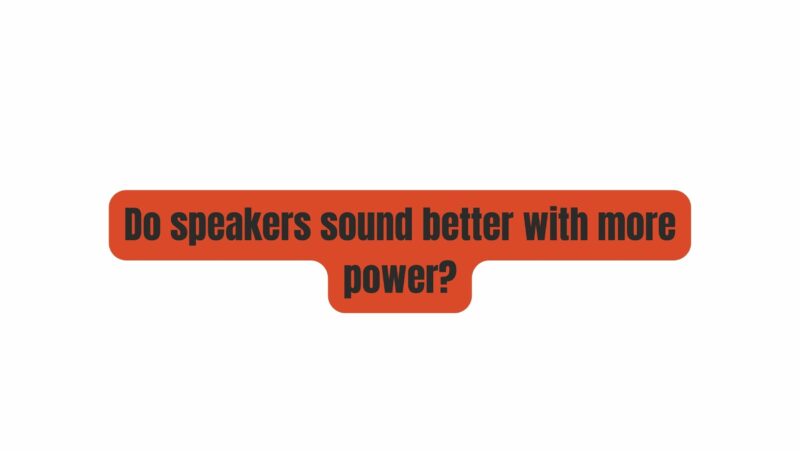When it comes to audio systems, one often hears the adage that “more power is better.” This idea suggests that speakers will sound better when paired with a high-powered amplifier. However, the relationship between speaker power and sound quality is more nuanced than it may seem. In this article, we will delve into the complexities of this topic, exploring whether speakers genuinely sound better with more power.
Understanding the Role of Power in Speaker Performance
Before we address the question directly, it’s important to understand the role of power in speaker performance:
- Translating Electrical Energy into Sound: Speakers convert electrical signals from an amplifier into sound waves. The power supplied by the amplifier determines how loudly the speakers can reproduce these signals.
- Handling Dynamic Range: Power also plays a crucial role in handling the dynamic range of audio. A powerful amplifier can reproduce both subtle nuances and intense peaks in the music without distortion or clipping.
- Resonance and Bass Response: Adequate power is essential for reproducing deep bass frequencies accurately. Low-frequency sounds require more power to move air effectively.
- Speaker Sensitivity: Speaker sensitivity, measured in decibels (dB), indicates how efficiently a speaker converts electrical power into sound. High-sensitivity speakers require less power to produce the same volume as low-sensitivity speakers.
The Myth of “More Power, Better Sound”
The notion that “more power equals better sound” is a common misconception. While it’s true that providing sufficient power to your speakers is vital for good sound quality, simply increasing power without considering other factors can lead to issues:
- Distortion: Excessive power can cause speakers to distort, producing unpleasant sounds. If the amplifier exceeds the speaker’s power handling capabilities, it can lead to clipping and distortion.
- Damage: Overpowering speakers can damage their components, such as voice coils and diaphragms, reducing their lifespan and overall performance.
- Unnecessary Costs: Purchasing a high-powered amplifier when your speakers don’t require it can be costly and provide no tangible benefit.
The Role of “Clean Power”
Clean power refers to an amplifier’s ability to provide a stable, undistorted signal to the speakers. Clean power is more important than sheer wattage when it comes to sound quality. Here’s why:
- Distortion-Free Sound: Clean power ensures that the electrical signal sent to the speakers remains free of distortion, resulting in clear and accurate sound reproduction.
- Reduced Clipping: Clean power minimizes the risk of clipping, which occurs when the amplifier cannot provide the required power, leading to distortion and damage.
- Speaker Protection: Clean power helps protect your speakers from potential harm caused by excessive or distorted signals.
Finding the Right Balance
To achieve optimal sound quality, it’s essential to strike a balance between speaker power and amplifier capability. Here are some considerations:
- Match Amplifier to Speaker: Choose an amplifier that closely matches the power requirements of your speakers. Look at the speaker’s recommended power range and aim for an amplifier that falls within that range.
- Consider Sensitivity: High-sensitivity speakers are more efficient and require less power to produce the same volume as low-sensitivity speakers. Take speaker sensitivity into account when choosing an amplifier.
- Room Size: Consider the size of your listening room. Larger spaces may benefit from more powerful amplifiers to ensure adequate sound coverage.
- Music Genre and Preferences: Different music genres may have varying power requirements. For example, classical music may not need as much power as heavy rock or electronic music.
- Personal Taste: Ultimately, your personal taste plays a significant role. Listen to your setup and adjust the power accordingly to achieve the sound quality you desire.
Conclusion
The relationship between speaker power and sound quality is a multifaceted one. While it’s true that providing sufficient power to your speakers is crucial for good performance, blindly adhering to the belief that “more power is better” can lead to issues like distortion and damage. Clean power, which ensures distortion-free signals, is equally important, if not more so, than raw power.
In the quest for the best sound quality, it’s essential to consider factors such as speaker sensitivity, room size, and music preferences. Finding the right balance between power and clean power is key to achieving a sound that not only meets but also exceeds your expectations. Remember that achieving optimal sound quality often involves a thoughtful and balanced approach rather than simply cranking up the power.


